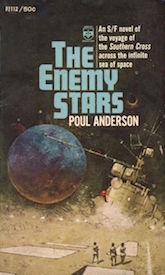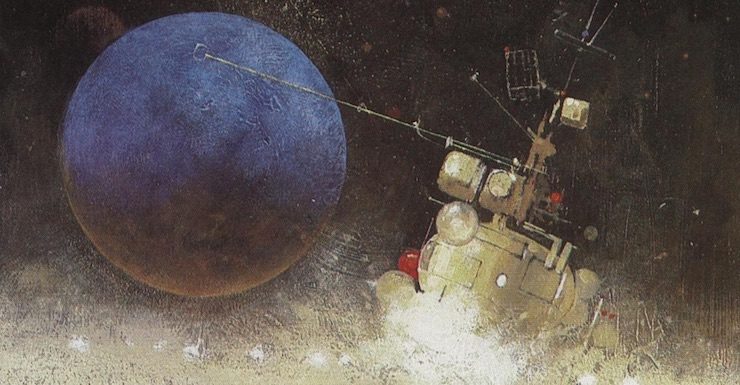I first read Poul Anderson’s The Enemy Stars in 1976, not all that long after its first publication in 1959. If I had not already been an Anderson fanboy, this book would have made me one. The novel had sense of wonder in spades, and the stock elements in the book were ones as yet unfamiliar to me. I was the ideal reader, being an undemanding, gullible fifteen-year-old. Later rereadings revealed some characteristic Poul Anderson weaknesses. Yet the book does one important thing right, which is why I still reread it from time to time.
Autocratic Earth dominates its extrasolar colonies thanks to a network of “mattercasters.” The mattercasters deliver people, or goods, instantaneously; however, the terminals must first be placed by ships operating at sublight speeds. Expanding the network of mattercasters is the work of generations. Humans have invested centuries in this task, but have only explored a tiny fraction of the Milky Way. For the ships placing the terminals, surprises are still the rule, not the exception.
When the Southern Cross encounters a dead star seemingly older than the current scientific estimate of the age of the universe, the sublight starship is diverted to take a closer look. Actual investigation falls to living humans: spoiled dilettante scientist Tarangi McClaren, newly married would-be colonist David Ryerson, covert revolutionary engineer Chang Sverdlov, and dutiful pilot Seiichi Nakamura. They take a hundred-light-year step to the dark system.
Once there, impatience leads to catastrophe. The quartet is marooned in a dead system, with their interstellar communicator destroyed. Even if they had been able to send out an SOS, the nearest starship would be decades away. The crew must find some way to harness the meagre resources of the dead star or die a light-century from home.
Mattercasters work by destructively scanning the original, beaming a hyper-accurate description to a distant ‘caster, which reconstructs the object. Modern readers may wonder why, if the mattercaster network has the bandwidth to do that, Earth doesn’t just remotely pilot their space probes. There’s no drama in inadvertently sending a space probe to its doom. Readers may also wonder why, if mattercasting is expensive, bulk goods like food are shipped from one system to another. Look! Over there! The Winged Victory of Samothrace!
For much of his career, Anderson wrote one-dimensional, stereotyped women characters. Anderson did eventually moderate his views somewhat¹, but readers looking for women with agency might avoid this book. There is one woman who exists to pine for her husband and one who exists to be a pretty set of ears into which McClaren can pour exposition. Neither of them is on the ship.
The men are underdeveloped as well. Eisenhower-era SF novels were short, not much longer than novellas today, which meant that there was little room for character development if plot, world-building, and endless exposition took up too many pages. Calling the characters stereotypes may be unduly harsh. Call them “stock characters.”
The setup doesn’t really make sense, the characters are thin, and the science is dated². So why reread this book?
Scale. Sense of wonder. This introductory passage about what it took to get Southern Cross from Sol to the dead star:
They manned her by turns, and dreamed other ships, and launched them, and saw how a few of the shortest journeys ended. Then they died.
And other men came after them. Wars flamed up and burned out, the howling peoples dwelt in smashed cities and kindled their fires with books. Conquerors followed, and conquerors of those, an empire killed its mother aborning, a religion called men to strange hilltops, a new race and a new state bestrode the Earth. But still the ships fell upward through night, and always there were men to stand watch upon them. Sometimes the men wore peaked caps and comets, sometimes steel helmets, sometimes decorous gray cowls, eventually blue berets with a winged star; but always they watched the ships, and more and more often as the decades passed they brought their craft to new harbors.
 The universe is very, very big and humans are infinitesimal. Anderson embraces this in a way few of his contemporaries did. Anderson’s individual worlds are not Paramount backlot stages conveniently scaled to flatter the actors. His worlds are all as big as the Earth, some bigger, each unique.
The universe is very, very big and humans are infinitesimal. Anderson embraces this in a way few of his contemporaries did. Anderson’s individual worlds are not Paramount backlot stages conveniently scaled to flatter the actors. His worlds are all as big as the Earth, some bigger, each unique.
That’s what SF promised the teen me … and what I still look for. Anderson delivered on the promise. He took worldbuilding very seriously. He understood the sheer immensity of the universe. He holds out no hope that humans will ever explore the whole universe, or know everything there is to be known³. No species will last long enough to explore and know completely. This is daunting, and at the same time, comforting. There will never be an end to wonder.
1: One side effect of this moderation was a number of incredibly defensive introductions to late 1970s reprints of his early work.
2: The failure to imagine space probes is more forgivable if you consider that the novel was published just before the first robot interplanetary probe was launched.
3: The Enemy Stars empire spans (roughly) the same chunk of the galaxy to which our radio signals may have reached. A handy map can be found at the other end of this link.
In the words of Wikipedia editor TexasAndroid, prolific book reviewer and perennial Darwin Award nominee James Davis Nicoll is of “questionable notability.” His work has appeared in Publishers Weekly and Romantic Times as well as on his own websites, James Nicoll Reviews and Young People Read Old SFF (where he is assisted by editor Karen Lofstrom and web person Adrienne L. Travis). He is surprisingly flammable.










